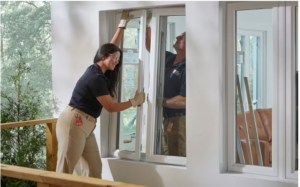Windows play a crucial role in maintaining a home’s energy efficiency and overall comfort. When properly installed, they can reduce energy consumption, increase comfort levels, and enhance the aesthetic appeal of a property. However, achieving these benefits requires the expertise of professional window installers who understand the intricate balance of function and design. This article explores how window installers ensure energy efficiency and home comfort through careful selection, installation techniques, and ongoing maintenance.
Understanding the Importance of Proper Window Installation
Proper installation is the foundation for energy efficiency and home comfort. A well-installed window not only provides an aesthetically pleasing look but also prevents air leaks, water infiltration, and heat transfer. Window installers are trained to assess the specific needs of a home and recommend the best window solutions to improve insulation and overall comfort. Without expert installation, even the best quality windows can underperform, resulting in higher energy bills, uncomfortable indoor temperatures, and unnecessary wear on HVAC systems.
Choosing Energy-Efficient Windows
Before installation, window installers guide homeowners in selecting the most energy-efficient windows based on factors such as climate, home design, and energy goals. The energy efficiency of windows is determined by several key components:
- Window Frames: The material of the frame influences thermal insulation. Options like vinyl, fiberglass, and wood offer better insulation compared to aluminum, which tends to conduct heat.
- Glass Technology: Double or triple-glazed windows with low-emissivity (Low-E) coatings are common choices. These coatings reflect heat back into the home during winter while blocking solar heat in the summer, helping to maintain a consistent indoor temperature.
- Gas Fillings: Some windows are filled with inert gases such as argon or krypton between the panes of glass. These gases have better insulating properties than air, reducing heat loss and improving energy efficiency.
Window installers work with homeowners to identify the most suitable window materials, designs, and glass technologies that meet specific energy-saving goals.
Proper Installation to Prevent Energy Loss
Even the best windows will fail to perform if they are not installed properly. Gaps or misalignments during installation can lead to air leaks, moisture intrusion, and drafts. These issues compromise the energy efficiency of the home, leading to higher heating and cooling costs.
Professional window installers use advanced techniques to ensure a precise fit. This includes:
- Accurate Measurement: Before installation, window installers measure each window frame carefully to ensure the window will fit snugly within the existing space.
- Sealing and Insulation: Quality installers use weather-resistant sealants and insulating materials around the window frame to eliminate air gaps. This process is essential for maintaining a tight seal that prevents heat transfer.
- Flashing and Water Management: Installing proper flashing and drainage systems prevents moisture from accumulating around the window, which could lead to mold, mildew, or water damage. This is especially crucial in areas with heavy rainfall or fluctuating temperatures.
Enhancing Home Comfort Through Soundproofing
Beyond energy efficiency, window installers also focus on enhancing a home’s comfort by improving acoustics. Soundproof windows, especially in busy urban areas or homes near highways, can significantly reduce external noise pollution. This added benefit creates a quieter and more peaceful living environment.
Specialized soundproofing technologies include:
- Laminated Glass: This type of glass helps to absorb sound vibrations, making it more effective in reducing noise transmission compared to regular glass.
- Multi-Layer Glazing: Double or triple-glazed windows with varying thicknesses of glass are effective at dampening noise. The air or gas layers between the panes act as sound barriers, further reducing the transmission of noise.
Ongoing Maintenance for Continued Efficiency
For continued energy efficiency and home comfort, regular maintenance is essential. Over time, window seals can degrade, and the materials used in window construction may show signs of wear. Window installers often offer maintenance services to help homeowners address these issues before they lead to larger problems. This may include resealing windows, replacing damaged weather stripping, or checking for gaps that could compromise energy efficiency.
Conclusion
Window installers play a pivotal role in ensuring that windows contribute to both energy efficiency and home comfort. From selecting the right type of window to using precise installation methods and providing ongoing maintenance, their expertise helps homeowners optimize their living environments. Whether through improved insulation, noise reduction, or moisture control, the work of professional window installers goes beyond just aesthetics — it directly impacts the energy performance and overall comfort of a home.

